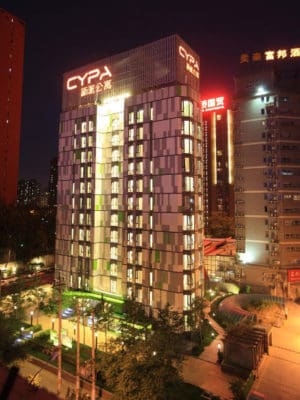
Wang Gehong, chief executive of CYPA
China is now enabling operators of rental housing projects to convert their income streams into listed securities, as the government moves to foster affordable housing for the country’s growing middle class.
The Shenzhen Stock Exchange announced this month that China Young Professionals Apartments (CYPA), a rental housing operator backed by Chinese private equity firm SAIF Partners, has won approval to issue RMB 270 million ($40.77 million) worth of securities based on rental income from the homes it operates in China’s first-tier cities.
The new financial product, which is modelled after the real estate investment trust (REIT) format, is the country’s first rental property-backed security offered to retail investors. The instrument combines two policy priorities in one package, representing another step toward financial innovation while China’s authorities look to combat lofty home prices by promoting rental housing.
Another Milestone on China’s Path to REITs?
“The announcement offers further positive evidence that the Chinese government actively supports the development of a C-REIT marketplace,” commented Peter Verwer, head of Singapore-based Asia Pacific Real Estate Association (APREA), in an exchange with Mingtiandi regarding Beijing’s interest in establishing Chinese REITs.
Mainland China’s first real estate investment trust (REIT) went public on the Shenzhen stock exchange in June 2015, the product of a joint venture between China Vanke and Penghua Fund Management Company.

A CYPA rental apartment property in Beijing
This past February, mainland authorities approved the first REIT-like product on the interbank market.
As these products have been backed by office buildings and some are restricted to institutional investors, the SAIF product breaks new ground by applying the REIT approach to rental housing cashflows. China has yet to finalise a regulatory framework for the launch of a standard REIT.
Last month, China’s securities regulator was reported to be speeding up the process of drafting new rules for the launch of residential REITs, with trusts based on privately owned and public rental housing given first priority.
Rental Platform Wins Policy Support
Formed by SAIF Partners in 2012, Beijing-based CYPA is among a growing cohort of rental apartment platforms catering to urban China’s craving for affordable homes. The company, which operates for-rent apartments in prime locations in 15 cities across the mainland, has a combined asset value of more than RMB 160 million ($24 million), according to an account in The Wall Street Journal.
In 2014, CYPA opened its flagship apartment building in Beijing’s Chaoyang district, built specifically to house young white-collar professionals. The green building is designed to foster connections between residents, with amenities such as common spaces, a rooftop garden, and a communal wine cellar.
“The SAIF quasi-REIT responds to official statements in favour of a ‘build-to-rent’/multi-family asset class for housing,” Verwer noted. “There is growing global interest by governments that aim to improve housing affordability by fostering ‘build-to-rent’ solutions to complement traditional ‘build-to sell’ options.”
New Rules Aim to Build Multi-Family Sector
The approval of the new security dovetails with other national efforts to encourage the development of rental apartments. In May of last year, the State Council issued a six-point set of guidelines to foster the rental housing market, including offering financial support in the form of bonds, property-backed securities, and other products.
The guidelines also include encouraging real estate developers to rent out new houses or build new rental housing projects, boosting land supply for rental projects, and allowing commercial spaces to be converted for rental apartment use, among other measures.
To build up the pipeline of rental housing still further, the Shenzhen government last week approved the conversion of vacant commercial buildings for rental housing. China’s housing ministry announced in August a program to build homes for rent on rural land in 13 major cities, including Shanghai.
Leave a Reply